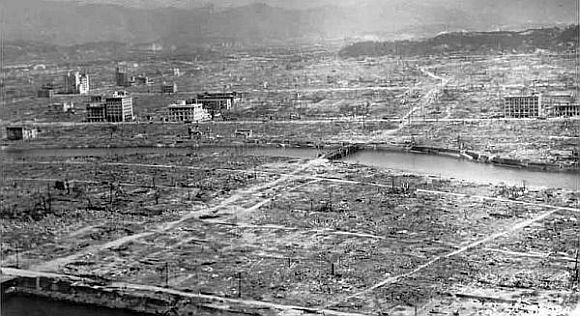
Setsuko Thurlow, who as a 13-year-old girl survived the atomic bombing of Hiroshima, writes: In [President Obama’s] famous speech in Prague, in 2009, he said, “As the only nuclear power to have used a nuclear weapon, the United States has a moral responsibility to act. We cannot succeed in this endeavor alone, but we can lead it, we can start it.”
Why then has the U.S. government, under the Obama administration, pledged $1 trillion over the next 30 years to modernize its nuclear arsenal? Exactly where is the moral responsibility and leadership in that?
Regarding disarmament, Obama stated, “Our efforts to contain these dangers are centered on a global nonproliferation regime, but as more people and nations break the rules, we could reach the point where the center cannot hold.” Why then are the U.S. and other nuclear weapon states actively boycotting the latest international nuclear negotiations? [Continue reading…]
Tim Wright writes: Under the Obama presidency, contrary to perceptions, the pace of nuclear warhead dismantlement has slowed, not hastened. Indeed, the two presidents Bush and Bill Clinton each made greater gains in downsizing the colossal US nuclear stockpile amassed during the cold war.
But more alarming than this failure to destroy old nuclear weapons has been the Obama administration’s aggressive pursuit of new, “smaller” ones, for which the threshold of use would be lower, according to former military commanders.
At great expense, the president has bolstered all three components of the nation’s “nuclear triad”: the strategic bombers, intercontinental ballistic missiles and submarine-launched missiles. This was the price paid for securing Republican support in 2010 for the ratification of a modest bilateral arms reduction treaty with Russia.
Obama’s much-publicised “nuclear security summits” largely ignored the greatest source of nuclear insecurity in the world today: 15,000 nuclear weapons, including 1,800 on hair-trigger alert. Instead, they focused on measures to keep “vulnerable nuclear material” out of terrorists’ hands – a vital endeavour, certainly, but for all the fanfare the results were small.
Now the United States is stridently resisting diplomatic moves by two-thirds of the world’s nations to declare nuclear weapons illegal. It boycotted UN talks in Geneva this month aimed at setting the stage for negotiations on a prohibition treaty. But it cannot veto this initiative, just as it could not veto the processes that led to bans on landmines in 1997 and cluster munitions in 2008.
While a prohibition on nuclear weapons will not result in disarmament overnight, it will powerfully challenge the notion that these weapons are acceptable for some nations. It will place them on the same legal footing as both other types of weapons of mass destruction – namely, chemical and biological weapons. [Continue reading…]

